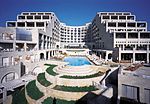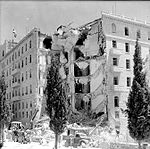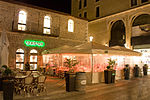Hebrew Union College – Jewish Institute of Religion
1875 establishments in OhioEducational institutions established in 1875Greater Cincinnati Consortium of Colleges and UniversitiesHebrew Union College – Jewish Institute of ReligionJewish seminaries ... and 11 more
Jewish universities and colleges in the United StatesJews and Judaism in CincinnatiReform JudaismReform Judaism in OhioSchools accredited by the Western Association of Schools and CollegesSeminaries and theological colleges in CaliforniaSeminaries and theological colleges in New York CitySeminaries and theological colleges in OhioUniversities and colleges in CincinnatiUse American English from July 2022Use mdy dates from July 2022

The Hebrew Union College – Jewish Institute of Religion (also known as HUC, HUC-JIR, and The College-Institute) is a Jewish seminary with three locations in the United States and one location in Jerusalem. It is the oldest extant Jewish seminary in the Americas and the main seminary for training rabbis, cantors, educators and communal workers in Reform Judaism. HUC-JIR has campuses in Cincinnati, Ohio, New York City, Los Angeles, California and Jerusalem. The Jerusalem campus is the only seminary in Israel for training Reform Jewish clergy.
Excerpt from the Wikipedia article Hebrew Union College – Jewish Institute of Religion (License: CC BY-SA 3.0, Authors, Images).Hebrew Union College – Jewish Institute of Religion
David HaMelekh, Jerusalem Nahalat Shiva
Geographical coordinates (GPS) Address Nearby Places Show on map
Geographical coordinates (GPS)
| Latitude | Longitude |
|---|---|
| N 31.776111111111 ° | E 35.222777777778 ° |
Address
David HaMelekh
9419008 Jerusalem, Nahalat Shiva
Jerusalem District, Israel
Open on Google Maps











